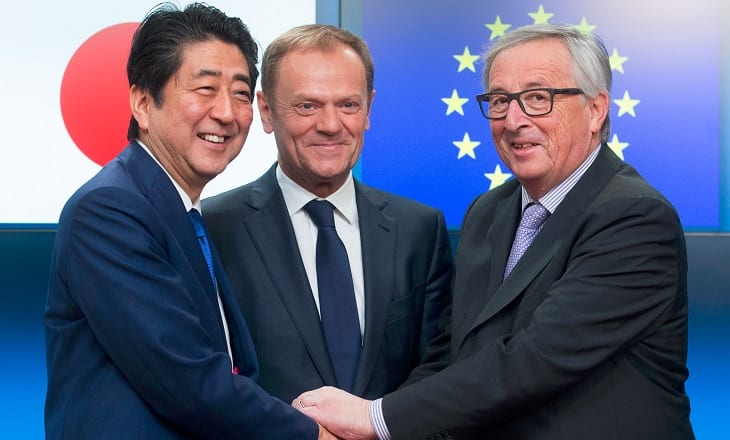Four years in the making and 18 rounds of negotiations later, and the Euro-Japanese free-trade agreement finally got the green light. Announced officially on Thursday 6 July, the colloquially named ‘cars for cheese’ deal is expected to increase European exports to Japan by €20bn a year, writes FXTM Staff Writer, Emma Davidson.

Emma Davidson, FXTM
Europe has pressed fast-forward on free-trade deals across the board. Agreements stuck at the bottom of the to-do pile have been dusted off and given a new lease on life as Brussels seeks to combat Washington’s protectionist stance. A Euro-Canadian deal was finally struck, and the long-awaited agreement between the EU and Japan reached a breakthrough last week, with compromises on the previously contentious issues of car and food exports agreed on.
The accord looks set to remove trade tariffs on 99% of traded goods. This will have significant implications for both economies, which collectively account for 19% of global GDP and a little under 40% of goods exported. Reducing Japanese tariffs on exports of meat, wine and dairy products was undoubtedly the European objective of the deal. For Tokyo, the opportunity to end customs duties with the world’s biggest importer of road vehicles was a significant win for their car industry.
The news of an agreement on the eve of the G20 summit last week gave the Euro the energy it needed to shake off dove-induced lows and gain against Sterling. Investor sentiment was buoyed by increased access to the world’s third-largest economy, not to mention Japan’s rapidly growing demand for agricultural products.
The deal has far reaching implications. If completed, a free-trade agreement between Japan and the Bloc could be obstructive for American manufacturers, and will certainly limit opportunities for U.S companies in both markets. Japanese Prime Minister Shino Abe will be hoping that this threat is enough to prompt Washington to re-evaluate the Trans-Pacific Partnership; a regional accord that was effectively lampooned by Trump’s withdrawal of the U.S back in January.
There is also the issue of Brexit to consider. The new Euro-Japanese deal is currently forecast to come into play in 2019, just as the UK is leaving the trading Bloc. Whether the currency trading markets are inclined to view Brexit more favourably in light of increased Japanese access to the European market remains to be seen. But, theoretically, if Japan can achieve a free-trade deal, then the chances of the U.K landing one are certainly looking up.
British exports, currently produced in line with EU regulations, are not subject to the traditional non-tariff barriers that Japan — or even new trading partner Canada — may suffer from. Incompatibility of product standards should not be a sticking point in UK-EU trade negotiations, and a free-trade agreement for post-Brexit Britain could go a long way towards bolstering the outlook for Sterling — something forex trading experts and market analysts will be keeping a close eye on.
Still only agreed in principle, the impact of the new accord has yet to be fully played out in the markets. Traders across the world will be waiting to see what action – if any – this agreement will provoke from Washington, and the implications it may have for Brexit negotiations and deals with other G20 countries moving forward. With at least two years until the start of its implementation, and plenty of fine tuning still to go, we could see the impact of this deal (and others like it) rippling through the markets for the foreseeable future.
Disclaimer: The content in this article comprises personal opinions and ideas and should not be construed as containing personal and/or other investment advice and/or an offer of and/or solicitation for any transactions in financial instruments and/or a guarantee and/or prediction of future performance. FXTM, its affiliates, agents, directors, officers or employees do not guarantee the accuracy, validity, timeliness or completeness of any information or data made available and assume no liability as to any loss arising from any investment based on the same.
Risk Warning: There is a high level of risk involved with trading leveraged products such as forex and CFDs. You should not risk more than you can afford to lose, it is possible that you may lose more than your initial investment. You should not trade unless you fully understand the true extent of your exposure to the risk of loss. When trading, you must always take into consideration your level of experience. If the risks involved seem unclear to you, please seek independent financial advice.
NOTES TO EDITORS
The FXTM brand provides international brokerage services and gives access to the global currency markets, offering trading in forex, precious metals, Share CFDs, ETF CFDs and CFDs on Commodity Futures. Trading is available via the MT4 and MT5 platforms with spreads starting from just 1.3 on Standard trading accounts and from 0.1 on ECN trading accounts. Bespoke trading support and services are provided based on each client’s needs and ambitions – from novices, to experienced traders and institutional investors. ForexTime Limited is regulated by the Cyprus Securities and Exchange Commission (CySEC), with license number 185/12, licensed by the SA FSB with FSP number 46614, and registered with the UK FCA under reference number 600475. FT Global Limited is regulated by the International Financial Services Commission (IFSC) with license numbers IFSC/60/345/TS and IFSC/60/345/APM.
